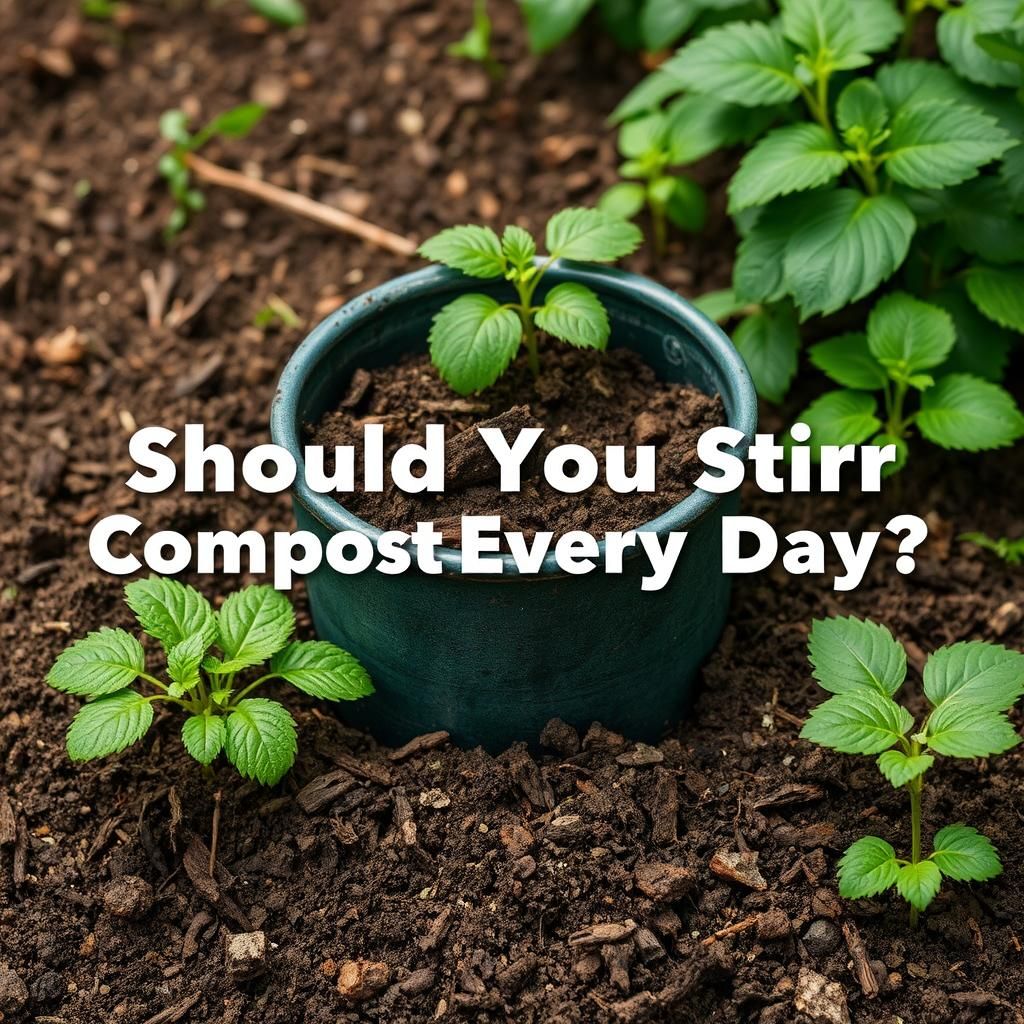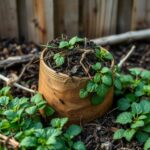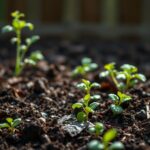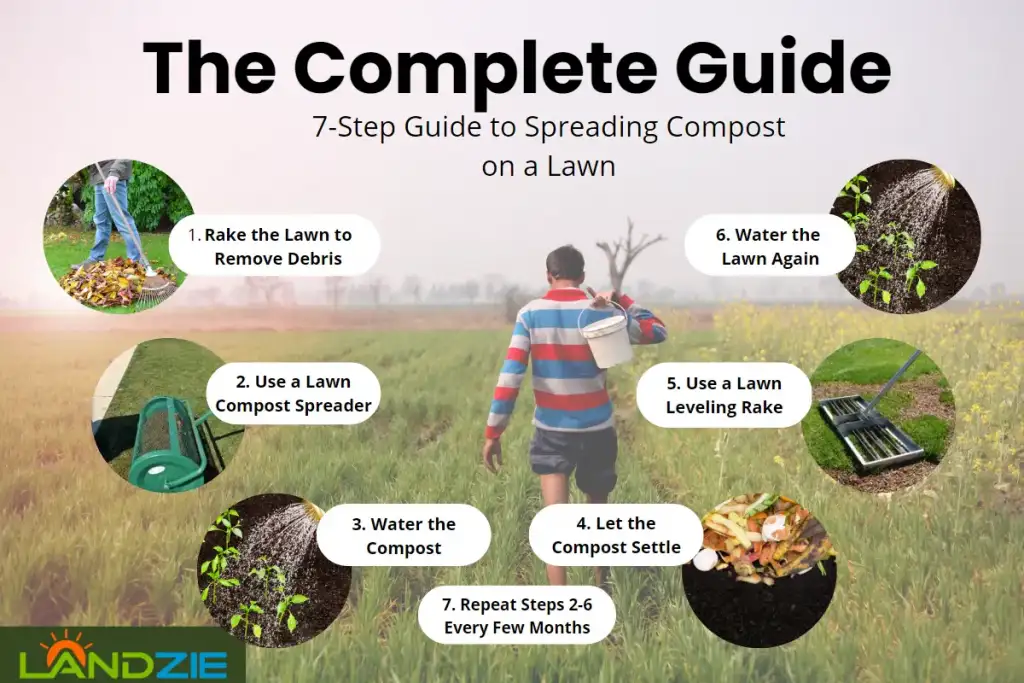Should You Stir Compost Every Day? Discover the Best Practices for Effective Composting

Composting is an eco-friendly way to recycle organic waste and create nutrient-rich soil for your garden. However, many novice composters wonder about the best practices to ensure an efficient composting process. One common question is whether it's necessary to stir your compost every day. In this article, we will explore the benefits and drawbacks of daily stirring, providing insights into how often you should aerate your compost pile. By understanding the optimal techniques for managing your compost, you can maximize its decomposition and contribute to a healthier environment. Let's dive into the best practices for effective composting.
Should You Stir Compost Every Day?
Stirring compost every day is generally not necessary and can lead to over-aeration, which may hinder the natural breakdown process. Composting relies on a balance of aerobic (oxygen-loving) and anaerobic (oxygen-hating) processes, so occasionally turning the pile is sufficient to ensure that air circulates through it and moisture levels are maintained. Most experts recommend turning your compost every few weeks, as this helps to maintain optimal conditions for microbial activity while preventing the compost from becoming too compacted or forming hard layers. Ultimately, the frequency of stirring depends on the composting system you are using, the materials you add, and your desired composting speed.
Benefits of Stirring Compost
Stirring compost provides several benefits that enhance the efficiency of the composting process. By introducing oxygen into the mix, you optimize conditions for beneficial microorganisms to thrive, which accelerates the decomposition of organic matter. This action also helps to distribute moisture and heat evenly throughout the pile, which can prevent odor problems and ensure that all materials break down uniformly. Regular stirring promotes an active compost environment, resulting in high-quality compost in less time.
Signs Your Compost Needs Stirring
Recognizing when your compost pile needs stirring can help maintain its health and effectiveness. Indicators include an unpleasant smell, which suggests anaerobic conditions, or visible layering in the materials where densely packed items like grass clippings may develop. Another sign is if the pile is too dry or too wet—stirring can help reintroduce moisture while redistributing dry materials. Additionally, if you see large chunks of organic matter that haven't broken down, it's a good idea to stir to break them apart and enhance decomposition.
Frequency of Stirring Compost
The frequency of stirring compost largely depends on the size and type of the pile, as well as the materials added. For hot composting systems, where temperatures can reach high levels, stirring every 3 to 7 days is generally recommended to maintain aerobic conditions and accelerate decomposition. For colder or slower composting methods, stirring every 2 to 4 weeks may suffice. Monitoring the overall health of your compost through temperature and moisture levels can help determine the ideal stirring frequency.
Potential Downsides of Daily Stirring
While it might seem beneficial to stir compost every day, this practice can have downsides. Daily stirring can disrupt the natural layering and breakdown progression of materials, leading to over-aeration and potentially drying out the pile. This disruption can cause beneficial microorganisms to die off, slowing down the decomposition process. Overly frequent turning can also compact the organic materials, making it harder for air to penetrate and leading to a less effective composting environment.
Best Practices for Compost Stirring
Adopting best practices for stirring compost can yield the best results. Use a garden fork or shovel to gently turn the compost, being careful not to break up the structure of the pile too much. Focus on moving the materials from the outside of the pile to the center, where the heat is often most concentrated. Always gauge the moisture levels—if it's too wet, add dry materials; if too dry, spray some water. Incorporating varied materials and maintaining proper balance among greens (nitrogen-rich) and browns (carbon-rich) will also enhance results when stirring.
| Aspect | Recommendations |
|---|---|
| Stirring Frequency | Every 3 to 4 weeks for most systems |
| Signs of Need | Bad odors, dry/wet conditions, visible layers |
| Stirring Method | Use a garden fork to turn gently |
| Avoid | Daily stirring can disrupt aerobic conditions |
| Material Balance | Maintain a ratio of greens to browns |
What happens if you don't stir compost?

If you don't stir compost, several consequences can arise that affect the quality and speed of decomposition. Composting relies on the aerobic breakdown of organic materials, which is facilitated by the presence of oxygen. When compost is not stirred, the oxygen levels can drop, leading to a less efficient composting process. Below are detailed explanations of what happens when you neglect to stir your compost.
Reduced Aeration
When compost is not stirred, aeration becomes significantly compromised. Oxygen is critical for the microorganisms essential to breakdown organic matter. Without adequate aeration:
- The microbial activity decreases, leading to slower decomposition.
- Odorous anaerobic bacteria may proliferate, causing foul smells.
- The overall temperature of the compost pile may drop, slowing microbial activity further.
Increased Contamination Risk
Stagnant compost is prone to various contaminants. Without stirring:
- Pathogens and pests are more likely to thrive due to the stable environment.
- Weeds may sprout from undecomposed seeds if the compost is not properly managed.
- Unwanted bacteria may dominate, leading to an unhealthy compost environment.
Poor Nutrient Distribution
The uniform distribution of nutrients is vital for producing high-quality compost. If you neglect to stir:
- Nutrients may become concentrated in specific areas rather than evenly distributed.
- Some materials may remain undecomposed, leading to inconsistent compost quality.
- Essential nutrients may be lost due to leaching if moisture is unevenly distributed.
Longer Composting Time
One of the primary benefits of turning compost is its ability to speed up the decomposition process. If you don't stir:
See also:
- The composting process can take significantly longer than necessary.
- Microbial populations may struggle to establish balanced ecosystems, delaying breakdown.
- Resources spent on removing undecomposed material can prolong the time before compost is usable.
Inconsistent Final Product
If you allow compost to stagnate and do not stir it, you may end up with an inconsistent final product. This can manifest in various ways:
- The compost may contain both fully decomposed materials alongside partially decomposed materials.
- The texture and smell may vary drastically, affecting usability in gardening.
- Quality may fluctuate, preventing predictable application rates and performance in gardens.
What are the 5 mistakes that people commonly make when composting with worms?

Here are the common mistakes that people make when composting with worms, along with related subtitles in HTML format:
1. Using the Wrong Types of Food
One of the most significant mistakes in worm composting is using the wrong types of food. Not all food scraps are suitable for worms, and offering them inappropriate items can harm their health. It's crucial to provide a balanced diet to your worms to ensure efficient composting.
- Citrus Fruits: High acidity can be harmful to worms.
- Dairy Products: Attract pests and create odors.
- Meat and Fish: Putrefy quickly and can cause foul smells.
2. Overfeeding the Worms
Overfeeding is a common problem among beginners. Worms have a limited capacity to process food, and putting in too much waste can lead to anaerobic conditions, which are detrimental to the composting process.
- Signs of Overfeeding: Unprocessed food on the surface.
- Avoid: Adding fresh scraps until the previous ones are consumed.
- Balance: Monitor food levels to ensure proper consumption.
3. Not Providing Enough Moisture
Worms thrive in a moist environment. However, failing to maintain appropriate moisture levels can cause the bedding to dry out, making it difficult for worms to thrive and perform their composting duties effectively.
- Ideal Moisture Level: Similar to that of a wrung-out sponge.
- Signs of Dry Bedding: Crumbly texture or visible dry spots.
- Solution: Regularly mist the bedding to maintain moisture.
4. Ignoring Temperature Control
Temperature plays a crucial role in the health of the worm population. Extreme cold or heat can stress the worms, reducing their activity and potentially leading to their death.
- Ideal Range: 55°F to 77°F (13°C to 25°C).
- Signs of Temperature Issues: Worms clustering at the surface or avoiding certain areas.
- Solutions: Insulate the bin or move it to a temperature-controlled location.
5. Neglecting to Aerate the Bedding
Proper aeration is critical in maintaining an effective worm composting system. Neglecting to aerate the bedding can lead to compacted material, creating anaerobic conditions that are harmful to worms.
- Benefits of Aeration: Enhances airflow and moisture retention.
- Methods: Gently mix the bedding and food scraps regularly.
- Signs of Compaction: Foul odors and visible signs of moisture buildup.
Can you overmix compost?

Yes, it is indeed possible to overmix compost. Composting is a natural process that requires the right balance of materials, moisture, and aeration. While turning or mixing compost is essential for aeration and speeding up decomposition, excessive mixing can disrupt the delicate balance of microorganisms and the overall effectiveness of the composting process. Overmixing can lead to several issues that may hinder the development of quality compost.
Understanding the Composting Process
The composting process involves the breakdown of organic materials by microorganisms, fungi, and other decomposers. This process requires:
- Carbon and Nitrogen Ratio: A balanced ratio of high-carbon (browns) and high-nitrogen (greens) materials is crucial.
- Aeration: Mixing adds oxygen which is essential for aerobic organisms.
- Moisture Levels: Compost should be kept moist but not waterlogged, as this helps microorganisms thrive.
Effects of Overmixing
Overmixing can lead to several negative consequences for your compost pile:
- Disruption of Microbial Activity: Frequent disturbance can kill beneficial microbes and slow down decomposition.
- Loss of Heat: Mixing cools the compost pile, which can reduce the heat needed for effective microbial activity.
- Compaction: Excessive handling can compact the materials, limiting airflow and slowing down the process.
Signs You Are Overmixing
Recognizing the signs of overmixing can help you adjust your composting routine:
See also:
- Slow Decomposition: If materials aren't breaking down as expected, it may be a sign of overmixing.
- Dryness or Compaction: A compost pile that is too dry or compacted could indicate it has been disturbed too much.
- Lack of Heat: If the pile is not heating up, overmixing may have occurred, affecting microbial activity.
Best Practices for Mixing Compost
To encourage optimal composting without overmixing, consider these best practices:
- Mix Sparingly: Turn your compost every few weeks rather than constantly.
- Monitor Conditions: Regularly check moisture and temperature to ensure a healthy compost environment.
- Use Appropriate Tools: Use a pitchfork or compost aerator that minimizes disruption to the microbial community.
Alternatives to Overmixing
If you're concerned about overmixing, here are alternatives to consider:
- Layering: Instead of mixing, layer different materials to maintain aeration without disruption.
- Adjust Moisture: Focus on moisture management to enhance decomposition without frequent turning.
- Use a Compost Tumbler: Tumblers allow for easy aeration without the need for excessive mixing.
How often should you spread compost?

Composting is a vital practice for maintaining healthy soil and promoting plant growth. The frequency at which you should spread compost can vary based on several factors such as the type of plants you're growing, your soil quality, and the climate in your region. Generally, compost can be applied annually, usually in the spring or fall, but some gardeners opt for more frequent applications. Below are detailed insights into the frequency and benefits of spreading compost.
When to Apply Compost in the Growing Season
Applying compost during the growing season can significantly affect plant health. Most gardeners prefer to spread compost in early spring before planting, as it provides essential nutrients just when plants need them most.
- Spring Application: Enhances soil fertility and encourages robust growth.
- Mid-Season Boost: A light top dressing can be done during the summer to rejuvenate plants.
- Fall Preparation: Adding compost in fall prepares the soil for winter and improves its structure.
Signs Your Soil Needs More Compost
Understanding the signs that your soil requires additional compost can help you optimize growth conditions. Look for visual cues and perform simple tests to assess your soil health.
- Poor Plant Growth: If plants are stunted or yellowing, it could indicate nutrient deficiency.
- Low Organic Matter: Soil that crumbles easily and lacks moisture retention may need compost.
- Heavy Clay or Sandy Conditions: Both types of soil can benefit from added organic matter to improve their structure.
Types of Plants and Compost Needs
Different plants have varying nutrient requirements, which can influence how often you need to spread compost. For instance, flowering plants and vegetables may need more frequent applications compared to perennials.
- Vegetable Gardens: Require compost at least once a year and preferably twice during their growing season.
- Flower Beds: Spring and fall applications can help maintain vibrant blooms.
- Ornamental Plants: Use moderate composting to ensure healthy growth without overwhelming the plants.
Environmental Considerations for Composting
Climate and environmental conditions can also dictate how often compost should be applied. Humidity, rainfall, and soil temperature can affect the decomposition rate and nutrient availability.
- Wet Climates: Compost may break down faster, requiring less frequent applications.
- Dry Regions: Composting may need to be done more regularly to maintain moisture and nutrient levels.
- Extreme Temperatures: In hot or cold environments, compost may need to be adjusted according to temperature-related growth cycles.
Best Practices for Spreading Compost
To maximize the benefits of compost application, following best practices is key. Proper techniques can enhance the effectiveness of the compost and foster soil health.
- Even Distribution: Spread compost evenly to ensure all plants receive nutrients.
- Incorporation: Mixing compost into the top few inches of soil improves nutrient availability.
- Moisture Management: Water the area after spreading compost to help it settle and begin to break down.
Questions from Our Readers
Should you stir compost every day?
It is not necessary to stir compost every day. In fact, stirring it too frequently can disrupt the composting process. Generally, turning your compost every few weeks is sufficient to provide aeration and help with the breakdown of organic materials.
What happens if you don't stir the compost?
If you do not stir the compost, it may become compacted, which can inhibit airflow and slow down the decomposition process. This can lead to a foul smell and a less efficient composting environment, as aerobic bacteria thrive in well-aerated conditions.
How often should compost be turned?
The ideal frequency for turning compost usually ranges from every two weeks to once a month, depending on factors like temperature, moisture, and the materials used. Regular turning helps ensure even decomposition and higher-quality compost over time.
Can you over-stir compost?
Yes, it is possible to over-stir compost, which can disturb the balance of bacteria and microorganisms crucial for healthy decomposition. Too much agitation can also lead to drying out the compost pile, making it less effective, so it's essential to find a balance.
See also:

If you want to read more articles like Should You Stir Compost Every Day? Discover the Best Practices for Effective Composting, we recommend you check out our Compost category.
Leave a Reply
Related Articles